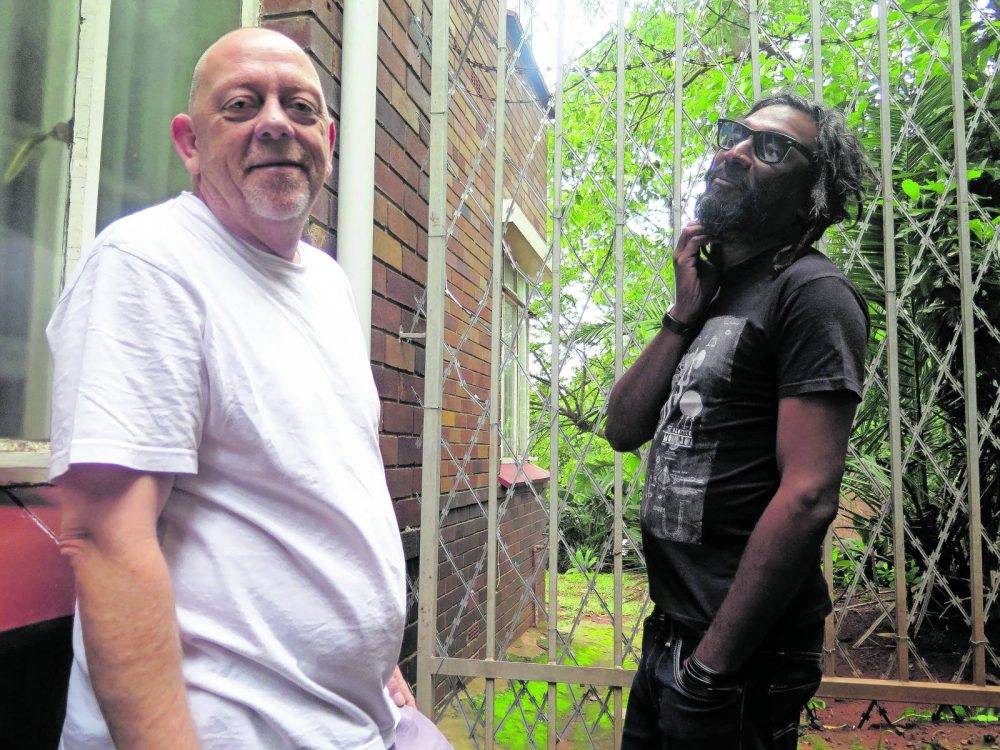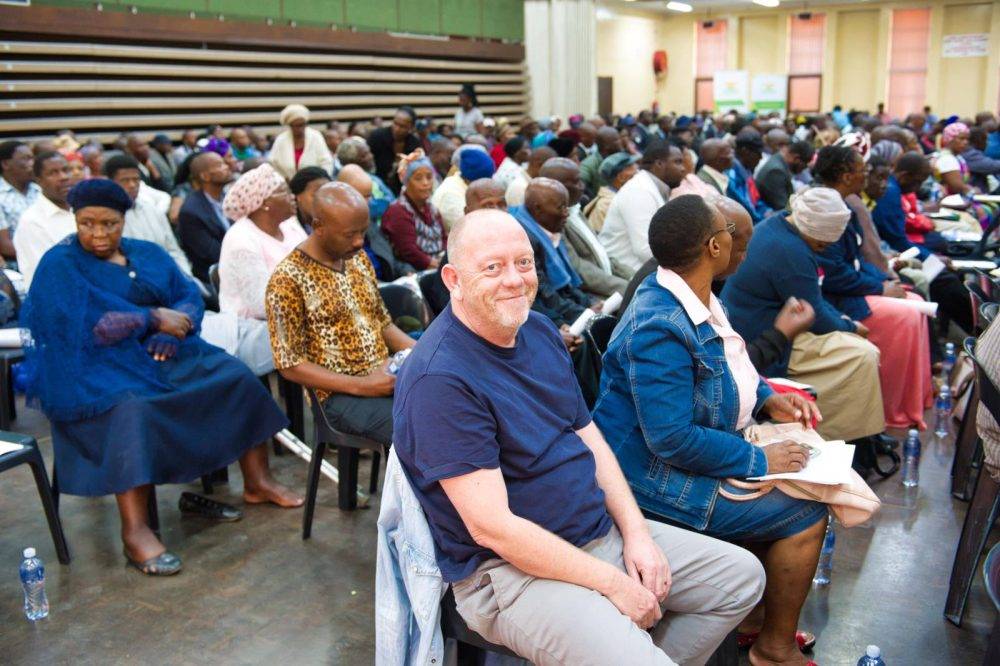Paddy Harper. (Delwyn Verasamy/M&G)
Saturday. Morning. I’ve had the kind of twisted, surreal night that my bra Paddy Harper would have chortled at.
There is a message from our other close bra, the photographer Rafs Mayet, the first line of which is visible and stirs dread: “Bru just got some disturbing news that …”
The second line was below the fold.
“… Paddy passed away.”
Paddy Harper the journalist. The writer. The sloping, stoner flaneur … the friend of the people, is dead.
Harper’s death from a heart attack on the morning of 25 January was a “don’t come Monday” the world was not ready to send him. Never should have sent him. Not this world. One divided by hatred, inequality and the increasingly unfettered powers of political and economic elites. Not when all the injustices his journalism fought against appear to be running rampant. When we need journalists like him more than ever.
Harper “told stories”. He played a computer’s keyboard as if it were a baby grand piano.
The cranked-up sound of his fingers filing on deadline sometimes punctuated by a giggle — or a cackle — when he knew an investigation was going to stir up shit, or a column punchline was going to hit some “muppet” hard.
Paddy wrote sentences shorter than Ernest Hemingway’s. Some of his greatest were merely one word long. Delivered quick-fire, with the atonality of Miles Davis on trumpet, with the rat-a-tat intensity of Mabe Thobejane on percussion.
His love for music, jazz especially, were the notes to how he wrote. Likewise his empathy for the ordinary punter and his driving, un-mucked about belief in the equality of, and justice for, every South African.
He was one of my best friends. My ma se kind. A brother-in-arms: in life and in journalism.
We ran amok.
Especially in the period 2000-2012 in KwaZulu-Natal. I worked at the Mail & Guardian. Harper at the Sunday Times and then City Press. Durban was emerging from successive summers of house music and ecstasy. The province had shifted into ANC hands and was becoming a political focal point for the country’s aspirations and anxieties.
Then-president Thabo Mbeki had fired his deputy Jacob Zuma, who was rising from the dead, criss-crossing the province and country, corralling ethnicity, a virile charisma, popular culture and the factional nature of the ANC to redefine the party’s post-apartheid, in-power character.
He would ride that Zunami to become ANC president at its 2007 elective conference in Polokwane, and eventually the country’s leader in 2009.
It wasn’t quite sex, drugs and politics, but it was pretty close.
Rallies featuring Zuma were like pheromone-drenched concerts. Harper and I packed for ANC elective conferences as though they were music festivals. The weed kept us entertained during the long hours of kicking about waiting for something to happen — a leak or a press conference.
At the 2007 Polokwane conference we got drunk on Irish whiskey with Kader Asmal after Cyril Ramaphosa refused his nomination as a “third-way” candidate for the party presidency. The pint-sized politician’s swearing increasing with every sip of nectar.
We crashed pro-Zuma celebrations where French champagne was being mixed with fizzy drinks for toasting.
Once, at the ANC’s 2012 Mangaung elective conference, we necked psychedelic mushrooms en route to a party hosted by a KZN businessman backer of Zuma.
The businessman was a contact of Paddy’s — despite his sharp pen, everybody liked Harper and we got into the best parties. We noticed the stars first. The fact that we were on the highway to Cape Town, second. We made it to the jol much later than expected.
Some of our finest moments of deviance related to Zuma. In 2009 Msholozi’s first official state visit as commander-in-chief was to Angola. Harper was there for the Sunday Times, me for the M&G.
 Humble, but connected: Paddy Harper (left) worked closely and jolled passionately with the author, Niren Tolsi, especially in KwaZulu-Natal in the early 2000s. (Rafs Mayet)
Humble, but connected: Paddy Harper (left) worked closely and jolled passionately with the author, Niren Tolsi, especially in KwaZulu-Natal in the early 2000s. (Rafs Mayet)
On the final day of the trip we were at a loose end inside Eduardo dos Santos’s presidential compound while the presidents and ministers were in the palace signing bilateral agreements. Sunday Times photographer Simphiwe Nkwali was busy with the photo-op. We were bored.
Then Harper got that familiar maniacal glint in his eyes. The cherubic but mischievous grin suggested one thing. Harper tested the wind. We went for a stroll around the presidential gardens and fired up a spliff despite the security heavies patrolling around. Blazing joints in highly securitised places was one of our little games.
Harper played hard. He worked hard too. Personal danger wasn’t countenanced when there was a story worth telling.
In the 1980s while working at the Post, Mercury and New African, he ran around KwaZulu-Natal’s killing fields, sometimes getting shot at in the crossfires between Inkatha and the self-defence units. He was one of the few wit ous who reported on, and caroused in, the townships — at a time when he could easily have been mistaken for a cop, and taken out.
Despite sticking it to Inkatha, Harper’s journalism was respected, and he was a celebrity among both politicians and punters in Ulundi, the seat of the former KwaZulu bantustan.
No visit to that dusty crossroads was complete without Harper being invited to some celebration or slaughtering where meat was abundant and whisky flowed. Likewise at Nkandla, Zuma’s rural homestead — Harper was always connected despite the truth he consistently spoke to power.
The province, Zululand especially, was his backyard. He lost his heart and mind there often.
The son of Gerald and Winnie Harper, William “Paddy” Harper arrived in South Africa in 1975 from Belfast. He was nine years old and his family of Irish Protestant stock — some of his relatives back home were Orangemen. Yet, a dissident to the core, Harper became an avowed Republican, growing up to be immersed in the anti-apartheid struggle in South Africa.
He was a revolutionary comrade. Harper was so committed to a free South Africa that he burnt his British passport and claimed single citizenship to this country. He was a singular wit ou.
That act of political bravado proved a stumbling block when his bosses at the Sunday Times deployed him to cover the 2004 tsunami in Indonesia. A South African passport wasn’t going to get him into the country. But a plan was made through a contact at the British Embassy. People would make plans for Paddy because he was humble and connected with them. He was loved.
He covered the tsunami, the floods in Mozambique, the political and economic meltdown in Zimbabwe. He went to Muammar Gaddafi’s Libya and smoked hash. His investigation with Sipho Masondo into how the South African Democratic Teachers Union was selling jobs won the 2014 Taco Kuiper Award. He co-authored the book The Lighter Side of Life on Robben Island: Banter, Pastimes and Boyish Tricks.
His chapter on Black Consciousness leader — and another rascal of note — Strini Moodley was one of the book’s stand-outs.
Recently he was the bête noire of the Ingonyama Trust Board and its former chairperson Jerome Ngwenya. He investigated water shortages down the KZN South Coast and reported on illegal housing evictions.
His columns exposed political shithousery with wit.
Journalists always grapple with whether their being fucked up draws them to the profession, or whether its the job that fucks them up. It is a gig of constant deadline chasing and irreplaceable adrenaline rushes, of bearing witness to bloody violences that linger for generations, of constantly trying to replenish energy and empathy to listen to people and do justice to their stories, of holding power accountable despite the dangers.
 The late M&G political editor, Paddy Harper.
The late M&G political editor, Paddy Harper.
Harper was fallible. He wrestled with demons. His appetites were sometimes as voracious as his curiosities. I was there when he was self-destructive. He was there when I was. He was forthright about the times he struggled with substance abuse. But those experiences added layers to his journalism too.
Harper could see the world from the perspective of a button-head in the gutter. Because he had been there. He could see it from a position of white privilege. Because it was a shame he sought to scour. His experiences meant he understood the world from so many angles. These are the complexities and contradictions that made his journalism so iconoclastic.
These experiences enhanced his openness to every person and their situation — the mark of a truly excellent journalist — which, as M&G photographer Delwyn Verasamy remembers — meant stories “just came to us” when they went into the field together in recent times.
Paddy Harper, 59, was a mentor and friend to so many. He was a reporter’s reporter. He was an outee and an OG. As a journalist and a South African he was the very best of us.
Wherever you are my brother I hope the ocean is nearby, that you have a spliff in one hand and a whisky in the other, and that both Winston Mankunku and Zim Ngqawana are vying for your attention with their saxophones. I will love you always.